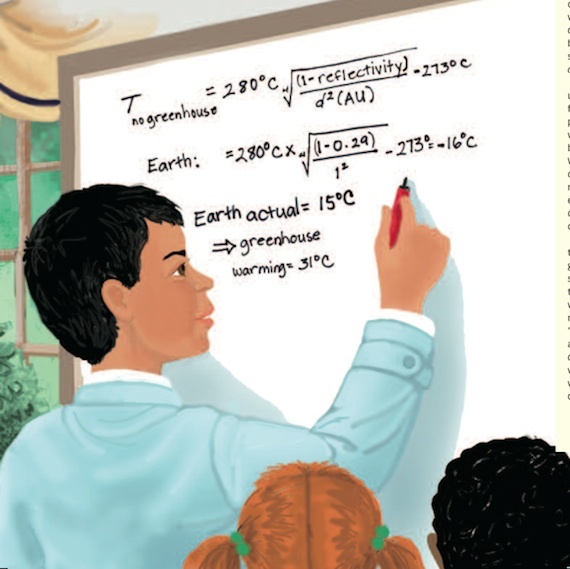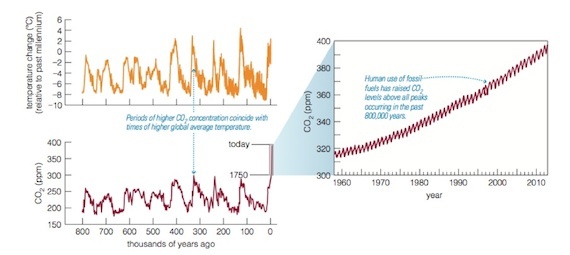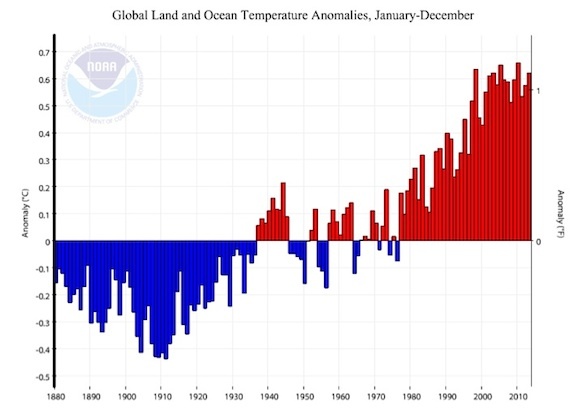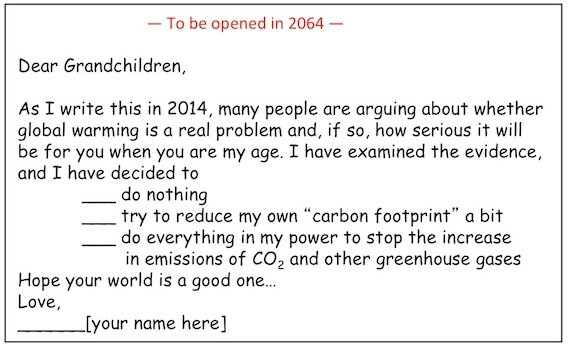
Do you believe that global warming is a real threat? If so, can you explain why? If not, can you explain why not? Most people have an opinion on the first question, but I've found that relatively few can answer the followups. In other words, most Americans have opinions of global warming based on what Stephen Colbert calls "truthiness" -- which comes from the gut, rather than from facts -- and can't even explain why they believe as they do.
So if you've landed on this post in hopes of learning the real facts behind the science of global warming, I think you'll find that you've come to the right place. I created the following video to explain the basic science that's necessary for developing an informed opinion:
I hope you'll watch the video, but I'll summarize the main point here. Despite all the debate you often hear about global warming, the basic scientific case is so simple that it can be reduced to a three-step deductive argument:
Fact 1: Carbon dioxide traps heat in the atmosphere. This fact was first measured in the laboratory more than 150 years ago and is necessary to explain why Earth is warm enough for life to begin with, as well as to explain the temperatures of all other planets in our solar system. Note that there is no scientific dispute about this fact whatsoever.
The actual calculation for Earth's temperature in the absence of greenhouse warming, from which we conclude that Earth is warm enough for life only because of the greenhouse effect caused by carbon dioxide and other greenhouse gases. (Image from The Wizard Who Saved the World.)
Fact 2: Human activity is adding carbon dioxide to Earth's atmosphere. While the carbon dioxide concentration varies naturally over long periods of time, measurements show that it is now far higher than it has been for at least 800,000 years. Indeed, at this month's level of 400 parts per million (ppm), it is about 40-percent higher than it was at the time of the American Revolution, and is on track to be 100-percent higher (a doubling) within about the next 50 to 60 years. Again, there is absolutely no scientific dispute about the measured rise in the carbon dioxide concentration, and there is also no doubt that the rise is a result of fossil fuel use, which releases carbon dioxide with a different isotopic signature than that of other carbon dioxide in the atmosphere.
Temperature and carbon dioxide data for the 800,000-year record from the European Project for Ice Coring in Antarctica; CO data since the 1950s from NOAA.
Conclusion: Clearly, if carbon dioxide traps heat and we are adding more of it, we should expect global warming to occur. The only possible way around this conclusion would be if there were some unidentified feedback that could offset the expected warming, but the data show clearly that the world is indeed warming much as expected. Globally, for example, we see a clear warming trend over the past century, and regional climate change has been even more striking. Moreover, while you may have heard it claimed that "global warming has stopped," the fact is that the past 15 years have been the hottest 15-year period on record, the past 10 years have been the hottest 10-year period, and the past five years have been the hottest five-year period. The pace of global warming does seem to be undergoing a slowdown that is likely temporary, but it has by no means "stopped."
Global average temperature, year-by-year, compared with the 20th-century average.
For anyone who is unsure about the issue of global warming, I urge you to study the above argument very carefully. As you will see, this is not a difficult scientific issue, and there is no room for any reasonable scientific doubt. Indeed, even among the global warming "skeptics" (at least those with scientific credentials), there is no debate over this basic argument. Instead, they argue either that natural feedback will keep the rate of warming slow enough to be manageable or that the consequences won't be severe. While we can't completely rule out the possibility that these skeptics might be right, the evidence to date makes it seem highly unlikely -- which is why the vast majority of scientists who have studied the issue have concluded that global warming is a serious and imminent threat to our civilization.
So watch the video, learn the facts, and form your own conclusions. Then take the "letter to your grandchildren" test: If you have (now or in the future) grandchildren, on average they will be your current age in about 50 to 60 years -- which is also when the carbon dioxide concentration will have reached double its preindustrial value unless we do something to stop its rise. Consider the effects of global warming that will be evident by that time, and ask yourself what your grandchildren will think of the efforts you made to mitigate those effects. Will they be proud of you?
For more details, see globalwarmingprimer.com. Also please come visit with the Story Time From Space team at the USA Science and Engineering Festival (with CASIS in booth 6419).



